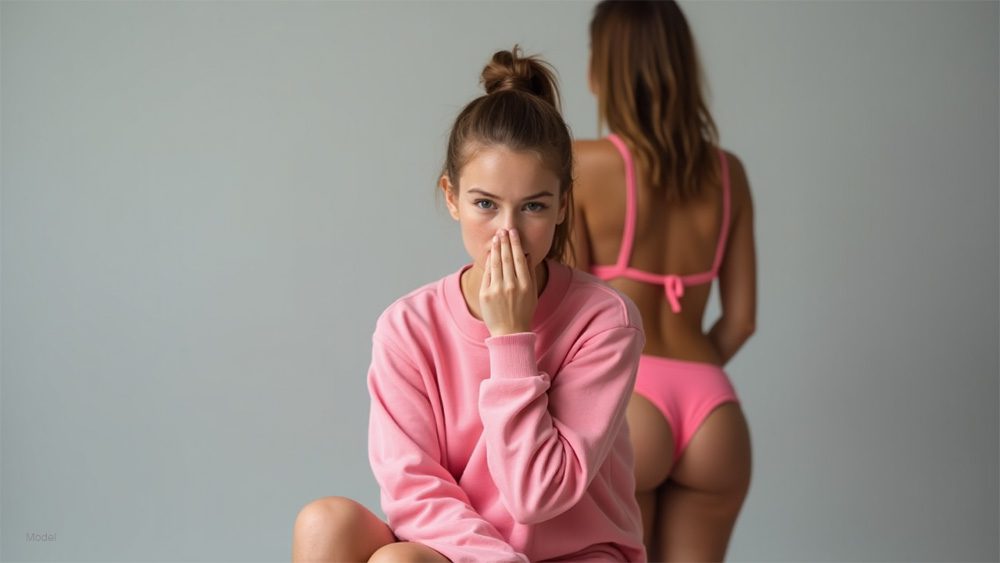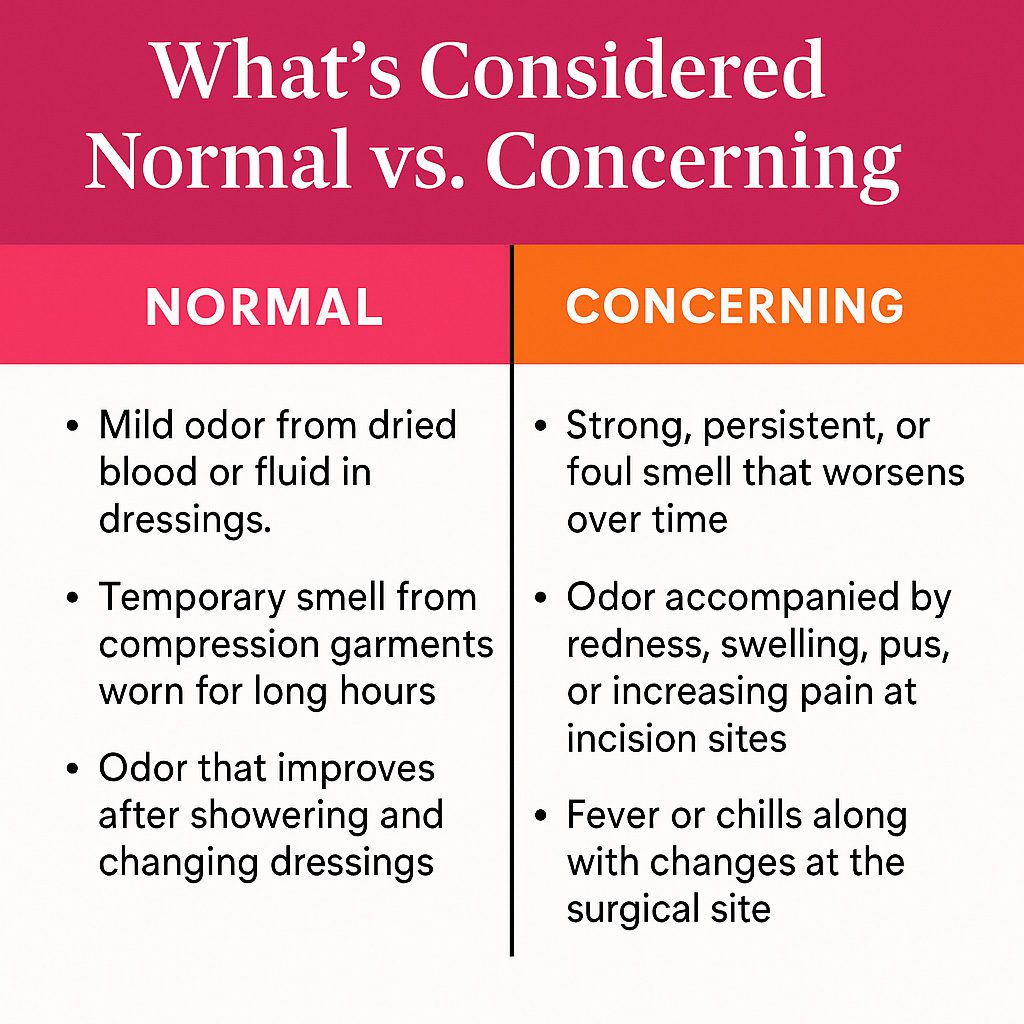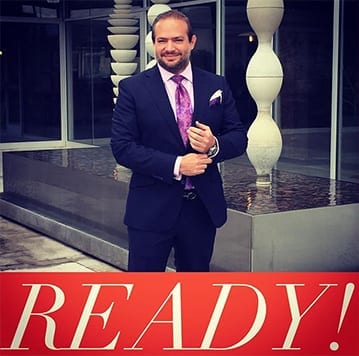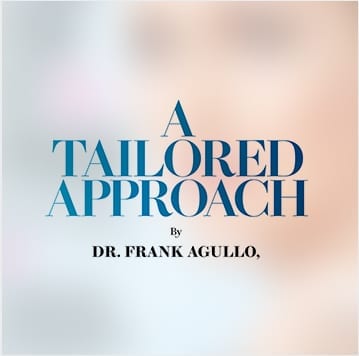September 05, 2025 | BBL

5 Min Read:
What Is the BBL Smell and Why Is Everyone Talking About It?
The Brazilian Butt Lift (BBL) is one of the most talked-about cosmetic procedures in the world. From celebrity speculation to concerns about safety, BBLs have generated plenty of headlines and social media buzz. The latest topic making waves online is something patients have started calling “BBL smell.”
Described by some as musty or rancid and even compared to the scent of a trash bag, this phenomenon has sparked questions from patients and even commentary from a few high-profile celebrities. But is “BBL smell” real? What causes it? And more importantly, can it be prevented?
The truth is that the hashtag #BBLSmell has been blown out of proportion online. While it may occur in certain circumstances during recovery, it is not something that happens to every patient, nor is it a permanent outcome of the procedure.
As a double board-certified plastic surgeon who performs BBL procedures regularly, I want to provide clarity on this trending topic and share what’s truly normal during recovery versus what should raise concern.
Is BBL Smell Real or Just a Viral Trend?
Yes, but not in the way social media might make it seem. The procedure itself is sterile and does not produce any odor. What some patients notice after surgery comes from the recovery process.
In my practice, I rarely encounter significant odor issues, especially in more conservative fat transfers, often called “skinny BBLs.” These procedures involve smaller fat volumes, which typically result in less drainage, easier hygiene, and lower risk of odor-related issues. Still, some patients undergoing larger-volume transfers may notice an unpleasant smell during healing.
What Causes BBL Smell During Recovery?
There are several reasons why patients may notice a smell after their surgery:
- Drainage and Dressings: Small incisions used for liposuction and fat transfer may drain fluid or old blood. When these fluids saturate dressings or garments, they can develop an odor.
- Compression Garments: These garments are worn continuously during recovery. If not cleaned frequently, they can trap sweat, fluids, and bacteria, leading to odor.
- Moisture and Hygiene Challenges: Limited mobility after surgery can make it harder for patients to clean thoroughly, especially in skin folds or creases.
- Bacterial Overgrowth: Warmth and moisture create an ideal environment for bacteria, which can cause odor.
- Fat Necrosis or Infection (Less Common): In rare cases, odor may signal fat necrosis (small areas of fat hardening) or infection. These issues are usually accompanied by other symptoms such as pain, redness, swelling, fever, or firm nodules.

Do Skinny BBLs Reduce the Risk of Odor or Smell?
Patients undergoing a skinny BBL, where smaller amounts of fat are transferred to create a more natural shape, usually face fewer odor-related challenges. Because less fluid is used and less fat is injected, there is reduced drainage and easier maintenance of personal hygiene.
In higher-volume transfers, hygiene can be more difficult because of increased swelling and changes in contour. Larger fat volumes also slightly increase the chances of fat necrosis, which may contribute to odor if not monitored.
How to Prevent BBL Smell and Maintain Hygiene After Surgery
Fortunately, there are steps patients can take to minimize or prevent odor after their procedure:
- Practice Good Hygiene: Cleanse surgical areas gently with antiseptic solutions as recommended. Many surgeons, including myself, suggest using antibacterial washes such as Hibiclens before and after surgery.
- Invest in a Bidet: For patients who find wiping difficult due to swelling, a bidet can be a helpful tool to maintain cleanliness.
- Rotate Garments: Wash compression garments daily. Having at least two garments allows one to be worn while the other is being cleaned.
- Use Liners: Placing clean, breathable dressings or liners inside garments can absorb moisture and reduce bacterial buildup.
- Professional Lymphatic Drainage: Postoperative massage can help reduce swelling and fluid retention, which may indirectly lower the risk of odor and fat necrosis.
- Monitor for Warning Signs: Strong or worsening odor, pus, increasing redness, pain, or fever should never be ignored. These symptoms may indicate infection and require medical attention.
BBL Smell Is Rare and Preventable: Final Takeaways
The so-called “BBL smell” is a real but uncommon occurrence. More often than not, it is linked to temporary drainage, garments, or hygiene challenges rather than the procedure itself. The viral #BBLSmell conversation has exaggerated the issue, making it seem like a universal outcome when in fact most patients never experience it.
At Southwest Plastic Surgery, my team and I guide patients through every step of recovery, from garment care to lymphatic massage, to ensure not only beautiful results but also a safe and comfortable healing process.
Thinking About a BBL? Let’s Talk
If you are considering a Brazilian Butt Lift or have questions about recovery, schedule a consultation with Dr. Frank Agullo at Southwest Plastic Surgery. Every patient deserves personalized care, expert guidance, and results that look and feel natural. Contact us.



